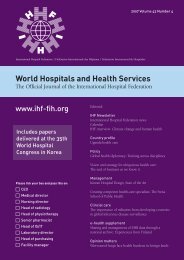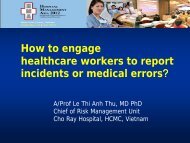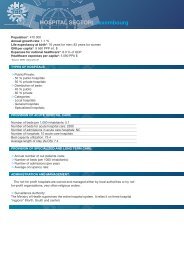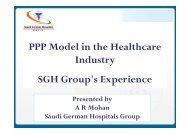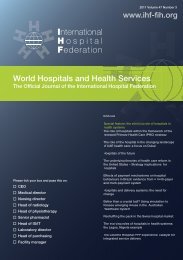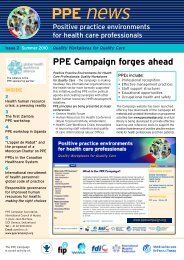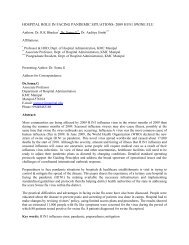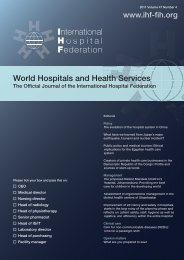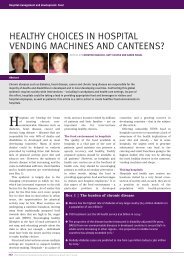World Hospitals and Health Services - International Hospital ...
World Hospitals and Health Services - International Hospital ...
World Hospitals and Health Services - International Hospital ...
Create successful ePaper yourself
Turn your PDF publications into a flip-book with our unique Google optimized e-Paper software.
POLICY: THE HEALTH SOCIETY<br />
women’s role changes, health becomes a political<br />
programme through the women’s health movement of the<br />
1960s <strong>and</strong> 1970s <strong>and</strong> personal health exemplified in slogans<br />
such as ‘the personal is political’ or ‘my body belongs to<br />
me’. Also around this time the growing self help <strong>and</strong> mutual<br />
aid movements increasingly questions that the doctor always<br />
knows best <strong>and</strong> patient associations <strong>and</strong> ‘Betroffenengruppen’<br />
constitute themselves as legitimate experts in ‘their’ disease<br />
<strong>and</strong> chronic condition. And the environmental movement<br />
explores <strong>and</strong> documents the impact of modern<br />
environmental risks on health. In the 1980s <strong>and</strong> 1990s<br />
health becomes an integrative force through the AIDS<br />
movements <strong>and</strong> a frame for the rights of the gay community.<br />
Today health – in particular the access to medicines such as<br />
ARV treatments – has become a key driving force in defining<br />
citizens’ rights in an era of globalisation. Three out of the<br />
eight United Nations, Millennium Development Goals are<br />
focused on health <strong>and</strong> health has become a key area that<br />
explores social innovation, social entrepreneurship <strong>and</strong> new<br />
kinds of policy networks <strong>and</strong> partnerships between the<br />
public <strong>and</strong> the private sector.<br />
And as health exp<strong>and</strong>s in modern societies the role of the<br />
citizen in health – as an individual who takes care of her own<br />
health, as a consumer in the health market place, as a<br />
patient in the health care system, as a voter on health care<br />
issues, <strong>and</strong> as a social actor together with others in NGOs<br />
<strong>and</strong> social movements – gains increasing importance. From<br />
the very beginning of modernity – when health moved<br />
beyond the confines of religion <strong>and</strong> charity to being defined<br />
as a right – health governance is always about inclusion <strong>and</strong><br />
exclusion <strong>and</strong> health governance debates are always also<br />
debates about values <strong>and</strong> social justice. After long periods of<br />
expansion in the realm of the state in alliance with the power<br />
for the medical profession, health is now faced with the next<br />
great period of expansion: the market <strong>and</strong> biotechnology on<br />
the one h<strong>and</strong> the power of the citizen/patient/consumer on<br />
the other.<br />
Governance means no more <strong>and</strong> no less than managing<br />
power relationships <strong>and</strong> increasingly these are changing<br />
dramatically in the health arena. <strong>Health</strong> is both a coproduced<br />
good <strong>and</strong> an infinite good – <strong>and</strong> its governance is<br />
no longer possible without the involvement of the citizen (as<br />
voter, actor, consumer, patient). The involvement of the<br />
citizen is crucial in all three territories of health (whose<br />
boundaries become increasingly unclear)<br />
➜ personal health (hygiene, lifestyles, wellness), [souci de<br />
soi, empowerment] the self as a reflexive project: an<br />
individual must find her or his identity amid the<br />
strategies <strong>and</strong> options provided by abstract systems – not<br />
just narcissism but appropriation of knowledge <strong>and</strong><br />
circumstances;<br />
➜ public health responsibility (medizinische polizey, public<br />
health <strong>and</strong> health policy), [social reform];<br />
➜ expert medical health (treatment, drugs, genetics <strong>and</strong><br />
bio-technology), [expert knowledge].<br />
The access to knowledge <strong>and</strong> information plays an ever<br />
larger role which is one of the reasons why health literacy<br />
Three out of the eight United<br />
Nations Millennium<br />
Development Goals are<br />
focused on health <strong>and</strong> health<br />
has become a key area that<br />
explores social innovation,<br />
social entrepreneurship <strong>and</strong><br />
new kinds of policy networks<br />
<strong>and</strong> partnerships between the<br />
public <strong>and</strong> the private sector.<br />
“<br />
”<br />
will need to become one of the key literacies in modern<br />
societies. What sociologists call the reflexivity of modern<br />
social life consists in the fact that social practices are<br />
constantly examined <strong>and</strong> reformed in the light of new<br />
incoming information about those practices thus<br />
constitutively altering their character. <strong>Health</strong> is now one of<br />
the areas in which knowledge <strong>and</strong> do-ability <strong>and</strong> promise<br />
exp<strong>and</strong> exponentially. Yet the hopes of The Enlightenment<br />
to claims of reason <strong>and</strong> of certitude in knowledge have not<br />
been fulfilled… in science today nothing is certain. What<br />
was healthy today is dangerous tomorrow. Blind trust in<br />
expert systems has been replaced by dialogue at best but<br />
also by increasing suspicion, one example is the recent<br />
debate on vaccination <strong>and</strong> autism. <strong>Health</strong> systems are<br />
becoming ever more complex to navigate, decisions on<br />
treatment need to be taken, complex drug regimes need to<br />
be adhered to, healthy lifestyles need to be lived – indeed<br />
both living with health <strong>and</strong> living with disease dem<strong>and</strong> high<br />
health literacy, reflexivity <strong>and</strong> constant decision making not<br />
only within the medical system but within the context of<br />
every day life.<br />
To some extent the three governance systems – personal,<br />
public, expert medical – also represent a historical sequence<br />
in which the medical health system has gained increasing<br />
dominance both in terms of social definitions of health (the<br />
medical eye) <strong>and</strong> governance structures (the health system<br />
which is a system of curative medical care) clearly<br />
overshadowing the systems of personal health <strong>and</strong> public<br />
health. Now in the 21st century we are entering a new stage<br />
of health governance – which I call die Gesundheitsgesellschaft<br />
or health society.<br />
In the health society all three territories <strong>and</strong> systems of<br />
governance are exp<strong>and</strong>ing <strong>and</strong> as they move through society<br />
they increasingly overlap. The expansion of health in the<br />
health society is increasingly driven not by social reform or<br />
medical expert/knowledge systems but by the new mix<br />
between the driving force of empowerment of the<br />
citizen/consumer/patient <strong>and</strong> the driving force of the private<br />
market. This mix in turn shapes social reform (not classic<br />
political movements that shape social reform in health as in<br />
Vol. 40 No. 4 | <strong>World</strong> <strong><strong>Hospital</strong>s</strong> <strong>and</strong> <strong>Health</strong> <strong>Services</strong> | 13



